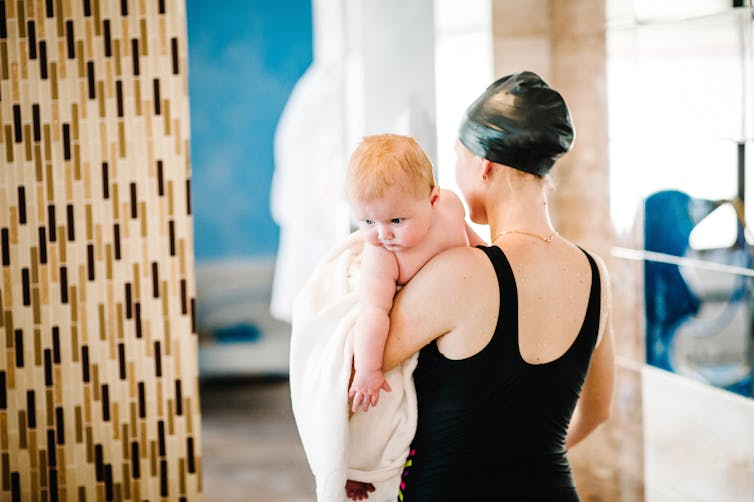Can I catch COVID from the pool? Not from the water but watch out for the change rooms and queues
- Written by Thea van de Mortel, Professor, Nursing and Deputy Head (Learning & Teaching), School of Nursing and Midwifery, Griffith University

As NSW and Victoria speed toward target COVID vaccination rates and the associated relaxation of lockdown rules, many are considering a trip to the local pool in the near future.
Already in NSW, you can swim at outdoor pools under certain conditions[1].
So, how can you stay safe and reduce your COVID risk when at the local public pool?
Here’s what you need to know.
Read more: Take a plunge into the memories of Australia's favourite swimming pools[2]
Can I catch COVID from the pool water?
No.
The World Health Organization (WHO) has said[3] “the COVID-19 virus does not transmit through water while swimming.”
And according[4] to Dr Sylvie Briand, director of the WHO’s Department of Global Infectious Hazard Preparedness:
if you swim in a swimming pool or in a pond, you cannot get COVID-19 through the water.
But if you go to a crowded swimming pool, and are close to other people one or more of whom is infected, then you can be infected by them. So, that’s why even in swimming pools, it’s important to maintain physical distancing and take precautions.
Can I catch it in the change rooms?
Yes.
At the pool, the most likely place to catch COVID-19 is in the change room.
That’s because the main way current variants of SARS-CoV-2 (the virus that causes COVID) spreads is via droplets and aerosols[5].
Droplets are larger exhaled particles that fall to the ground comparatively quickly, while aerosols are smaller particles that can hang in the air for longer and travel longer distances.
Your COVID risk is greater indoors than it is outdoors, where contaminated air is more likely to be whisked away on air currents.
The risk outdoors is also lower because ultraviolet radiation[6] from the sun and higher temperatures in sunlit areas also tend to inactivate the virus, rendering it non-infectious.
You can reduce the risk of droplet and aerosol transmission by:
Can I catch it queuing up?
Yes.
The key risk here is in how close you are to a potentially infected person, so don’t stand near others if you are queuing for entry to the pool – or lining up at the canteen for some post-swim hot chips.
The closer you are, the higher the risk, especially considering the Delta variant is much more transmissable[7] than some previous variants.
Again, physical distancing and mask wearing can help protect you.
Any other tips to reduce my COVID risk at the pool?
Other things you can do to reduce the risk of infection are to:
wear a mask when out of the water
make sure you check in with a QR code
physically distance from others at the poolside
steer clear of anyone yelling, coughing, sneezing or laughing (these activities can mean more droplets and aerosols[8], and therefore more risk)
use an alcohol-based hand sanitiser (60% alcohol) before touching your face or food
avoid public transport if possible. If you must use it, physically distance from others, wear a mask and open a window on the bus if you can.
Read more: From segregation to celebration: the public pool in Australian culture[9]
References
- ^ certain conditions (www.nsw.gov.au)
- ^ Take a plunge into the memories of Australia's favourite swimming pools (theconversation.com)
- ^ said (www.who.int)
- ^ according (www.who.int)
- ^ droplets and aerosols (www.cdc.gov)
- ^ ultraviolet radiation (www.sciencealert.com)
- ^ Delta variant is much more transmissable (www.cdc.gov)
- ^ more droplets and aerosols (www.ncbi.nlm.nih.gov)
- ^ From segregation to celebration: the public pool in Australian culture (theconversation.com)

















